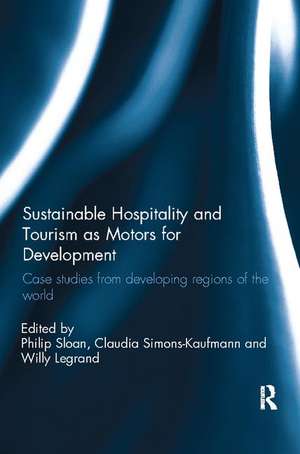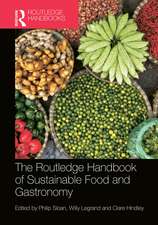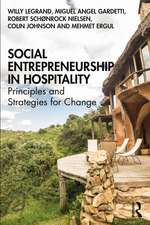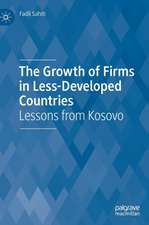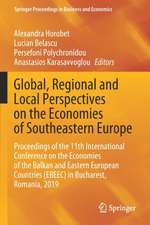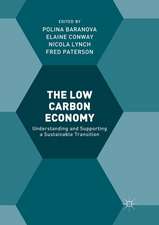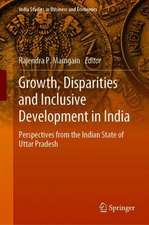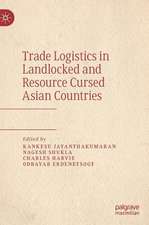Sustainable Hospitality and Tourism as Motors for Development: Case Studies from Developing Regions of the World
Editat de Willy Legrand, Claudia Simons-Kaufmann, Philip Sloanen Limba Engleză Paperback – 25 mai 2017
This book uses twenty-five case studies to demonstrate how it is possible to create income and stimulate regional socio-economic development by using sustainable hospitality and tourism attractions. These case studies focus on issues such as the protection of indigenous cultures as a source of touristic curiosity; the preservation of the environment and the protection of endangered species – such as the plight of turtles in Sri Lanka or butterflies in Costa Rica to encourage tourism. Some cases cover government supported projects, for example, the green parks venture and regional tourism development in the Philippines, an archaeological park initiative in Honduras and the diversity of nature tourism in St. Vincent.
Sustainable Hospitality and Tourism as Motors for Development is designed to give students, academics and practitioners a guide for best practices of sustainable hospitality operations in developing countries. Based on case studies, it provides a road map of how to achieve the goals of sustainability giving benchmark examples. The book not only taps into a contemporary business subject, but aims to provide readers with a better understanding of how sustainable theories can be put into practice in hospitality and tourism industries in developing countries.
| Toate formatele și edițiile | Preț | Express |
|---|---|---|
| Paperback (1) | 436.14 lei 6-8 săpt. | |
| Taylor & Francis – 25 mai 2017 | 436.14 lei 6-8 săpt. | |
| Hardback (1) | 1076.53 lei 6-8 săpt. | |
| Taylor & Francis – 21 iun 2012 | 1076.53 lei 6-8 săpt. |
Preț: 436.14 lei
Nou
Puncte Express: 654
Preț estimativ în valută:
83.45€ • 87.13$ • 69.07£
83.45€ • 87.13$ • 69.07£
Carte tipărită la comandă
Livrare economică 05-19 aprilie
Preluare comenzi: 021 569.72.76
Specificații
ISBN-13: 9781138081505
ISBN-10: 1138081507
Pagini: 496
Ilustrații: 172
Dimensiuni: 156 x 234 x 42 mm
Greutate: 0.45 kg
Ediția:1
Editura: Taylor & Francis
Colecția Routledge
Locul publicării:Oxford, United Kingdom
ISBN-10: 1138081507
Pagini: 496
Ilustrații: 172
Dimensiuni: 156 x 234 x 42 mm
Greutate: 0.45 kg
Ediția:1
Editura: Taylor & Francis
Colecția Routledge
Locul publicării:Oxford, United Kingdom
Cuprins
1. Introduction 2. The Case of Inkaterra: Pioneering Ecotourism in Peru 3. Integrated Circuits as a Tool for the Development of Sustainable Tourism in the Amazon 4. Bringing Sustainability to the Brazilian Hotel Industry 5. Preferences Regarding Restoration and Development at Copan Archeological Park 6. Mamirauá: Community Based Ecotourism in a Sustainable Development Reserve in the Amazon Basin 7. Ecuador: Huaorani Ecolodge 8. Tourism in the Peruvian Amazon: Experiences of a Private-Communal Partnership 9. Key Issues and Challenges to the Development of Community-Based Ecotourism in Guatemala 10. Tourism Cluster among Livestock: The Case of Bonito (MS), Brazil 11. Diversified Nature Tourism on St. Vincent 12. Can Ecotourism Support Coral Reef Conservation? Experiences of Chumbe Island Coral Park Ltd in Zanzibar / Tanzania 13. Blossoms & Butterflies, Waterfalls and Dragonflies: Integrating Insects in the Hospitality and Tourism Industries through Swarm Supposition 14. Sustainable Tourism Development in the Masai Mara National Reserve Kenya: Stakeholder Perspectives 15. Ecotourism in Vulnerable Regions: Opportunities and Obstacles to Development – The Case of Cantanhez, Guiné-Bissau 16. Minimission-Tourism in Ethiopia: A New Subspecies of Sustainable Volunteer Tourism? 17. Botswana: The Selinda Reserve 18. Sustainable Development of a Remote Tourist Destination: The Case of Soomaa National Park, Estonia 19. Challenges in Rural Ethnic Tourism Development: A Case Study from Yunnan, China 20. Hotel Management Education in Bhutan: Teaching Sustainable Principles 21. Investigating Potential Benefits of Proposed Eco-retrofits to an Existing Tourist Lodge in the Sundarbans, India 22. Urban Green Parks: Sustainable Tourism, Biodiversity and Quality Of Life: A Case Study 23. Philippine Sustainable Tourism Initiatives: Issues and Challenges 24. Turtle Night Watch Nature Tourism: Sharing Benefits to Sustain Local Community and Sea Turtles in Rekawa Sanctuary, Sri Lanka 25. Six Senses Hideaway Ninh Van Bay, Vietnam: Where Luxury Meets Sustainable Tourism 26. Tourist Destinations with Planned Interventions: The Success of Kumily in Kerala, India 27. The Development and Promotion Guidelines of Organic Farms for Sustainable Tourism
Notă biografică
Philip Sloan, Department of Hospitality Management at the International University of Applied Sciences Bad Honnef, Bonn, Germany
Claudia Simons-Kaufman, Department of Business Administration and Economics, International University of Bad Honnef, Bonn, Germany
Willy Legrand, Department of Hospitality Management at the International University of Applied Sciences Bad Honnef, Bonn, Germany
Claudia Simons-Kaufman, Department of Business Administration and Economics, International University of Bad Honnef, Bonn, Germany
Willy Legrand, Department of Hospitality Management at the International University of Applied Sciences Bad Honnef, Bonn, Germany
Descriere
It is now widely agreed that the climate is changing, global resources are diminishing and biodiversity is suffering. These changes pose huge challenges on nations, organizations, businesses, communities and ultimately individuals. Developing countries, many of them considered by the World Tourism Organization to be Top Emerging Tourism Destinations, are already suffering the effect of environmental degradation.
This book is designed to give students and practitioners a guide for best practices of sustainable hospitality operations in developing countries. Based on case studies, it provides a road map of how to achieve the goals of sustainability, giving benchmark examples.
This book is designed to give students and practitioners a guide for best practices of sustainable hospitality operations in developing countries. Based on case studies, it provides a road map of how to achieve the goals of sustainability, giving benchmark examples.
